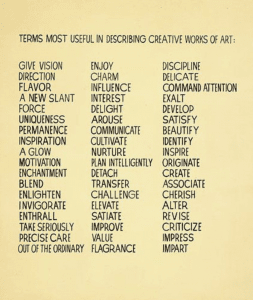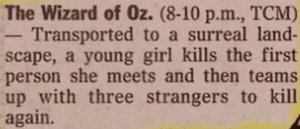The Inner You
You have a project and you have found a grant that fits the project. You have looked at the grant specifications and you have created a mental timeline of the process you will have to go through to hit the deadline. So now how do you convince a funder that your project has merit? 
The documents that are attached to the project – your resume and your work sample, for instance – are critical and important. For most grants, you also need a track record. And you need to be able to show a past sample of your craft, your talent, your art.
 But you also need to find your voice. You need to write your grant with the passion that you have inside of you for your work. That doesn’t mean that you should plead for your grant but rather you should be able to explain what is compelling about your work, or from where it comes from within you.
But you also need to find your voice. You need to write your grant with the passion that you have inside of you for your work. That doesn’t mean that you should plead for your grant but rather you should be able to explain what is compelling about your work, or from where it comes from within you.
If you are an artist, use words that evoke the feelings you are trying to capture in your art.
If you’re a filmmaker, you need to find a narrative arc in your work that you can state briefly, that will describe a storyline. For instance, here is a brief synopsis of my film about Jack Kerouac.
SNOWBIRD will span Jack Kerouac’s eleven years in Florida. He departs Greenwich Village just as the Sexual Revolution takes hold, and arrives in Florida as the John’s Committee begins its relentless search for gays in academia. Only months before On The Road is published, the shy poet is launched into un-wanted celebrity and is unable to adapt. He dies an alcoholic in St. Petersburg in 1969.
Embrace your subject and compel the grant reader into a story. There are many ways to find your inner voice.
Practice this process to help tighten your own understanding of your work: 
– First Exercise: write an analysis of your work or a storyline on a single sheet of paper – called a One Sheet. Try to keep it double or single spaced, a one-inch margin all sides, and 12 point font.
– Second Exercise: reduce your One Sheet to a 150 word paragraph.
– Third, reduce it further to a one-to-two sentence “log line,” similar to what you would find in TV Guide.
 This process can help you to understand and verbalize what you are trying to accomplish in your work. It can help you to find your voice.
This process can help you to understand and verbalize what you are trying to accomplish in your work. It can help you to find your voice.




